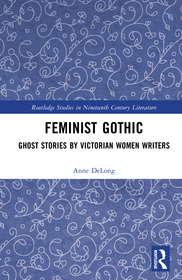
Feminist Gothic
Ghost Stories by Victorian Women Writers
Sorozatcím: Routledge Studies in Nineteenth Century Literature;
-
10% KEDVEZMÉNY?
- A kedvezmény csak az 'Értesítés a kedvenc témákról' hírlevelünk címzettjeinek rendeléseire érvényes.
- Kiadói listaár GBP 145.00
-
69 273 Ft (65 975 Ft + 5% áfa)
Az ár azért becsült, mert a rendelés pillanatában nem lehet pontosan tudni, hogy a beérkezéskor milyen lesz a forint árfolyama az adott termék eredeti devizájához képest. Ha a forint romlana, kissé többet, ha javulna, kissé kevesebbet kell majd fizetnie.
- Kedvezmény(ek) 10% (cc. 6 927 Ft off)
- Kedvezményes ár 62 346 Ft (59 378 Ft + 5% áfa)
Iratkozzon fel most és részesüljön kedvezőbb árainkból!
Feliratkozom
69 273 Ft

Beszerezhetőség
Még nem jelent meg, de rendelhető. A megjelenéstől számított néhány héten belül megérkezik.
Why don't you give exact delivery time?
A beszerzés időigényét az eddigi tapasztalatokra alapozva adjuk meg. Azért becsült, mert a terméket külföldről hozzuk be, így a kiadó kiszolgálásának pillanatnyi gyorsaságától is függ. A megadottnál gyorsabb és lassabb szállítás is elképzelhető, de mindent megteszünk, hogy Ön a lehető leghamarabb jusson hozzá a termékhez.
A termék adatai:
- Kiadás sorszáma 1
- Kiadó Routledge
- Megjelenés dátuma 2025. december 18.
- ISBN 9781041028529
- Kötéstípus Keménykötés
- Terjedelem218 oldal
- Méret 229x152 mm
- Nyelv angol 700
Kategóriák
Rövid leírás:
This examination of thirty-two ghost stories by twenty-one Victorian women writers defines a new genre, feminist Gothic, that utilizes the Gothic structure.
TöbbHosszú leírás:
This examination of thirty-two ghost stories by twenty-one Victorian women writers defines a new genre—, Feminist Gothic—that utilizes the Gothic structure and its uncanny atmosphere of ambiguity to deploy competing narratives that seek to undermine patriarchy by simultaneously upholding and subverting its dominant myths. While a surface reading of these tales often interprets the outer, public, overt voice—as one of patriarchal appeasement,—a second reading uncovers an inner, private, covert voice that undermines the first. By focusing exclusively on women’s stories and examining Victorian ghost stories by lesser-known women writers alongside those more widely disseminated and discussed, this study aims to establish a definition of feminist Gothic that transcends the binaries of horror/terror, physical/psychological, and intrusive/liminal. It also explores the issues that haunt the Victorian female literary imagination and techniques women writers employ to incarnate and exorcise those revenants. Aimed at scholars of feminist literary criticism, Victorian literature, and the Gothic genre, this study combines close readings of primary sources with current scholarship, arranged thematically in chapters that examine women’s issues, including marriage, children, and property ownership.
TöbbTartalomjegyzék:
INTRODUCTION: Haunted Narratives: Liminality, Narrative Reliability, and Resolution
CHAPTER ONE: Haunted Love: Drowned Women and Revenge Fantasies
“The Cold Embrace” (1860) by Mary Elizabeth Braddon
“A Terrible Vengeance” (1889) by Charlotte Riddell
Weeping Ferry (1898) by Margaret L. Woods
CHAPTER TWO: Haunted Memories: Pretty Boys and the Ones That Got Away
“The Last House in C— Street” (1856) by Dinah Maria Mulock
“Poor Pretty Bobby” (1873) by Rhoda Broughton
“Thorleigh Moat: A Grandmother’s Tale” (1876) by A. E. Barker
“The Story of the Rippling Train” (1888) by Mary Louisa Molesworth
“Uncle Abraham’s Romance” (1893) by Edith Nesbit
CHAPTER THREE: Haunted Marriage: Mesmerism, Deception, and the Runaway Wife
“The Man with the Nose” (1873) by Rhoda Broughton
“In the Séance Room” (1893) by Lettice Galbraith
“From the Dead” (1893) by Edith Nesbit
CHAPTER FOUR: Haunted Children: Legitimacy, Inheritance, and the Sins of the Fathers
“The Old Nurse’s Story” (1852) by Elizabeth Gaskell
“Walnut Tree-House” (1882) by Charlotte Riddell
“The Open Door” (1882) by Margaret Oliphant
CHAPTER FIVE: Haunted Families: Legacy and the Baggage of the Past
“The Secret Chamber” (1876) by Margaret Oliphant
“The Weird of the Walfords” (1895) by Louisa Baldwin
“The Undying Fire” (1895) by Mrs. St. Loe Strachey (Amy Strachey)
“The Ghost of the Sedan-Chair” (1896) by Marie Corelli
CHAPTER SIX: Haunted Rentals: Uncanny Familial Spaces
“The Truth, the Whole Truth, and Nothing but the Truth” (1868) by Rhoda Broughton
“Chantry Manor House: A Ghost Story” (1876) by Mrs. Hartley
“To Let” (1893) by B. M. Croker
CHAPTER SEVEN: Haunted Travel: Terror on the Road
“The Phantom Coach” (1864) by Amelia B. Edwards
“Under the Cloak” (1873) by Rhoda Broughton
“At the Dip of the Road” (1896) by Mary Louisa Molesworth
CHAPTER EIGHT: Haunted Others: The Racialized Ghost
Monsieur Maurice (1873) by Amelia B. Edwards
“The Story of Salome” (1873) by Amelia B. Edwards
“Old Mrs. Jones” (1882) by Charlotte Riddell
CHAPTER NINE: Haunted Bodies: Spirit Possession and Class Mobility
The Strange Transfiguration of Hannah Stubbs (1896) by Florence Marryat
“The Legend of Madame Krasinska” (1915) by Vernon Lee
CHAPTER TEN: Haunted Music: Ghostly Echoes and Hommes Fatales
“The Haunted Organist of Hurly Burly” (1886) by Rosa Mulholland
“A Wicked Voice” (1890) by Vernon Lee
“The Ensouled Violin” (1892) by Helena Blavatsky
Több



